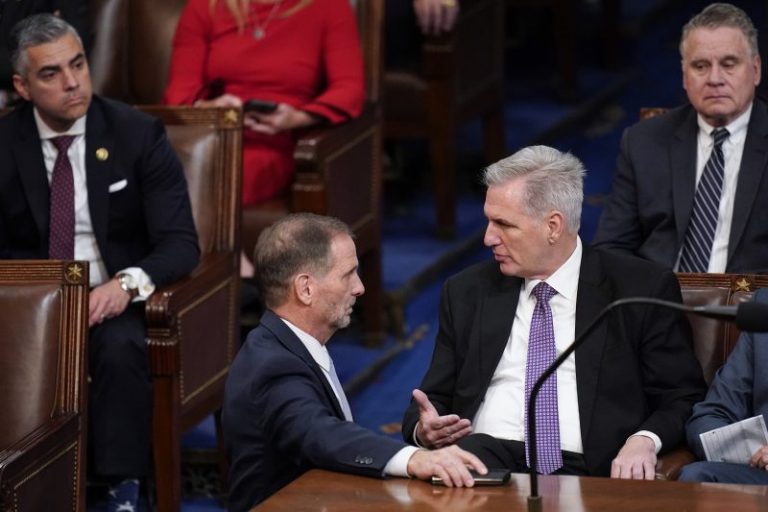Kevin McCarthy is giving away an increasing share of the store in the name of salvaging his languishing campaign for House speaker. The would-be speaker has bent to the House Freedom Caucus’s will through a series of major concessions, despite little evidence this is actually swaying enough members, or really any members.
Twenty-one Republicans voted against him in the seventh, eighth and ninth ballots Thursday — the same number as on each ballot Wednesday, despite McCarthy’s allies suggesting they had made progress overnight.
At some point, McCarthy’s GOP backers need to ask themselves how much they’re willing to entertain this strategy before it goes too far for them. That’s because McCarthy’s concessions could not just negatively impact them and their vision for the House, but it makes it more likely that even a speaker not named McCarthy would have to match them.
And some are indeed starting to raise concerns about the trajectory of these negotiations, suggesting McCarthy risks robbing Peter to pay Paul.
Rep. Chris Stewart (R-Utah) confirmed to MSNBC that there is a breaking point at which he and his fellow McCarthy backers could bolt, saying, “Honestly, there’s many of us who feel like we’re very, very close to that at this point.”
Stewart added: “If you go beyond that, you really would reach a point where … we’re not going to be ruled by them. And I think we’re nearing that threshold now, where two things: There’s only so much you can ask for, and I think we’ve reached that. And then the second thing is, if you go beyond that, you’re going to begin to lose the support of the other 200. Kevin I know is aware of that, and I think he’s careful not to go beyond that line.”
MSNBC: Is there anything that McCarthy could give up in these negotiations that would make you give up your support of him?
CHRIS STEWART: There actually is. And honestly, there’s many of us who feel we’re very, very close to that. pic.twitter.com/Oqf9zxzaUQ
— Aaron Rupar (@atrupar) January 5, 2023
Rep. Robert B. Aderholt (R-Ala.) raised similar concerns on Thursday morning. Speaking to reporters, he particularly objected to the McCarthy holdouts’ requests for subcommittee chairmanships. Among other things, McCarthy opponent Rep. Andy Harris (R-Md.) has reportedly been pushing for a health-related subcommittee chairmanship that Aderholt is in line for.
“As far as skipping over people’s seniority, I think you’ve gone too far,” Aderholt said, according to Politico’s Sarah Ferris.
Committee assignments might be the most personal aspect of all this. The McCarthy holdouts have also sought to obtain a certain number of seats on the influential House Rules Committee — enough seats, it would seem, to join with Democrats to prevent virtually anything from reaching the floor.
But that latter issue also points to the broader significance of the concessions: They risk allowing the House Freedom Caucus and its allies to gum up the works in a closely divided House. Along those same lines, the McCarthy holdouts secured a major concession allowing just one member to force a vote to remove the speaker at any point, otherwise known as a motion to “vacate the chair.”
That could also increase the leverage of a small handful of members over House business; indeed, a spokesperson for the last Republican speaker, Rep. Paul D. Ryan (R-Wis.) likened it to a “weapon pointed at [the speaker] all the time.” (This rule has existed for much of American history, but it looms larger with a very narrowly divided House and a Freedom Caucus willing to wreck shop.)
McCarthy allies are apparently beginning to ask themselves what all these concessions would mean for their ability to accomplish their goals — as they should, because of how far the Freedom Caucus has suggested (and even proven) it’s willing to go.
For example, one McCarthy holdout, Rep. Ralph Norman (R-S.C.), indicated Wednesday that to win his vote, McCarthy would need to be willing to shut down the government and default on the debt. Norman walked that back somewhat on Thursday. But it’s emblematic of what giving in to these members’ demands could portend.
If Aderholt and Stewart are serious about what they say, it could mean that whatever progress McCarthy makes with his right flank — to the extent that’s even possible — could come at the expense of his more establishment supporters. And given he can only lose around four votes, that reinforces his vexing speakership math problem.
It also raises the unlikely scenario of a bipartisan deal to elect the speaker. We’ve been skeptical that enough Republicans would ever join with Democrats to elect a more moderate GOP speaker, and if it’s even possible that would appear a long ways off.
But if there’s truly no level of concessions that can get McCarthy to 218 votes, the process could be pushed in that direction. And at some point, enough McCarthy backers might decide the growing list of concessions — whether in a McCarthy speakership or because any GOP-elected replacement would also have to agree to them — is worse than having to cut a deal with Democrats.
Again, we haven’t reached that point. But even if McCarthy doesn’t ultimately win, the things he offers during that process matter. And the fact that we’re now hearing his supporters ring some alarm bells surely thickens the plot.

